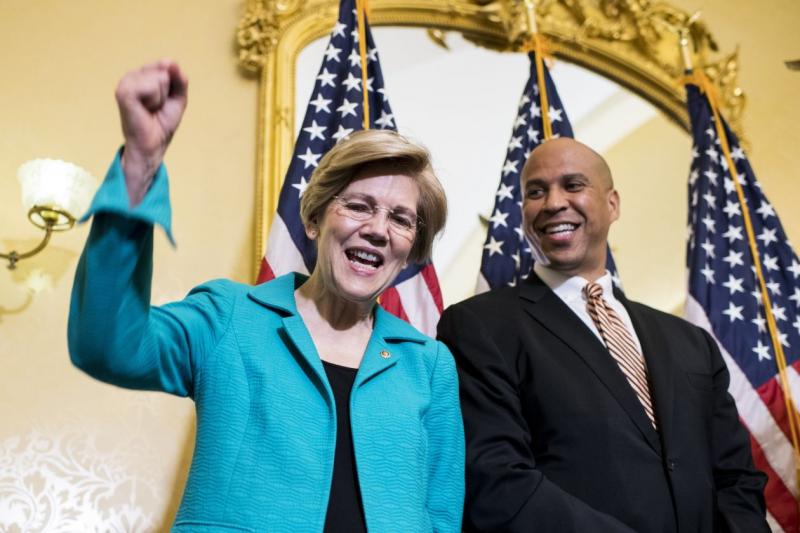
Senator Elizabeth Warren (D-Mass.) and Senator Cory Booker (D-N.J.) recently introduced two pieces of legislation that would put Washington bureaucrats further in charge of the financial and business activities of everyday Americans. If this sounds like nothing more than a series of signaling bills to use on the campaign trail for election to higher office, that’s exactly right.
Warren’s legislation, the Accountable Capitalism Act, would force corporations that make more than $1 billion in revenue annually to obtain a federal charter of corporate citizenship from the Department of Commerce to operate, and force private companies to hand over control to employees who may not even have a stake in the financial projections of the business.
In a Wall Street Journal op-ed paired with release of the bill, Warren plays the classic Democrat strategy of blaming CEOs and corporate management, arguing they funnel money to shareholders instead of employees and use stock buybacks to enhance their own wealth. However, as ATR’s Christina Mitsopoulos writes, “the stock market is far more accessible to average investors than most Americans think. Seventy-five percent of corporate investment is held by individual households, pension funds, mutual funds, and 401(k) funds rather than by taxable entities (i.e. “rich people”)”.
The legislation also includes portions that would further force these companies to allow employees to elect 40% of the business’s board of directors and requires a supermajority of “not less than 75 percent of the shareholders of the corporation and not less than 75 percent of the directors of the corporation” to approve any political expenditures.
This will only dictate the ways a private corporation is allowed to act, which is concerning considering political expenditures are often used as an avenue to build coalitions for smart regulatory frameworks or to advocate against laws that will add compliance costs. This approach also puts politics into the workplace, where employees will choose leaders based on their partisan beliefs and not on the long-term performance of the business.
On a similar big-government note, Booker’s legislation, the Stop Overdraft Profiteering Act, would prohibit overdraft fees on debit card transactions and ATM withdrawals, and further prohibit banks from charging more than one overdraft fee a month, with no more than six per calendar year.
Simply defined as a charge imposed when an individual spends more than what they have in their checking account, it is essentially a fee for allowing the customer to borrow extra money owned by the bank. Interestingly enough, Booker seemingly ignores the fact that overdraft fees only account for a small percentage of bank’s net income. Additionally, a study from the Bureau of Consumer Financial Protection (BCFP) found that the lion’s share of overdraft fees goes to only 8.3% of consumers who account for 73.7% of all overdraft fees charged by banks.
Further provisions of the legislation also include a mandate that would require banks to offer “a clear explanation of how the terms and fees for such alternative services and products differ”.
This is nonsensical considering a 30-second internet search can give consumers all the information needed about overdraft fees and charges. Just one of the numerous resources available is a detailed FAQ compiled by the Federal Deposit Insurance Corporation (FDIC) on overdraft rules and terms. The FDIC, a federal regulatory agency which oversees banks and insures bank deposits up to $250,000, also notes that the average overdraft fee is $35 and that many banks even offer overdraft protection.
While overdraft fees do not discriminate based on wealth, low-income people often use overdrafts as a form of a short-term loan. For example, someone could have bills exceeding what they have in their savings due on the 14th of the month, but get a direct deposit from their employer on the 15th, and can elect to pay the small fee from overdrafting instead of having multiple fees from paying their bills late.
Presenting their proposed laws as vital to saving consumers from what they see as being taken advantage of, their legislation will perpetuate a “Washington knows best” attitude that was largely responsible for the issues in the first place. The regulatory burden from the Dodd-Frank Wall Street Reform and Consumer Protection Act has increased legal and compliance costs for U.S. financial institutions, letting hardworking Americans deal with the fallout.
Warren and Booker were given a chance to help end the burdensome regulation back in March when the Senate voted on S.2155, the Economic Growth, Regulatory Relief, and Consumer Protection Act, which rolls back Dodd-Frank rules on small and regional banks, and credit unions. Yet, they chose to put likely presidential bids before consumer choice when they voted against the bill, which nevertheless was passed with widespread bipartisan support and later signed by President Trump.
What Democrats always seem to forget is that their political messaging bills have real world consequences, and when creating more hoops to jump through for businesses or capping overdraft fees, companies and banks will look elsewhere to make up lost revenue from higher operational costs. These costs are ultimately passed onto consumers and make it more challenging for those of low economic means to purchase products from companies or to participate in banking activities.
While one can make valid criticisms about greed in the financial system, shareholders and overdraft fees are not the source of that greed. Proposals to regulate them are nothing more than solutions in search of problems and would only hurt American consumers and workers. If Senators Warren and Booker really had the public’s best interests in mind, they would be pursuing pro-growth policies, not ones that only pander to the left.

